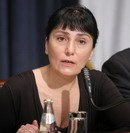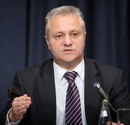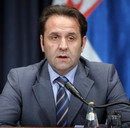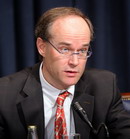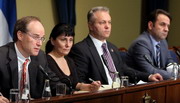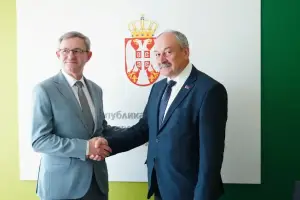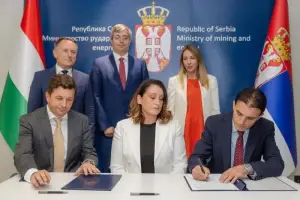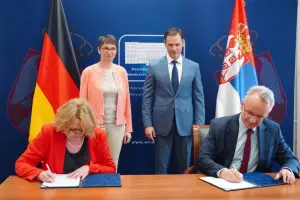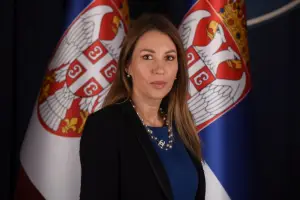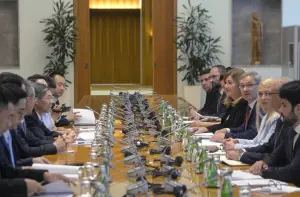Q:
A:
Serbia to receive €380m from IMF
Belgrade,
27 May 2010
Minister of Finance Diana Dragutinovic said today that talks on the fourth review of the stand-by arrangement between Serbia and the International Monetary Fund (IMF) have been completed and that Serbia will be able to withdraw an additional €380 million as support to foreign currency reserves.
Speaking at a joint press conference of IMF representatives and the Serbian government, Dragutinovic said that since the economic recovery has not progressed as expected, an agreement was made to increase the budgetary deficit due to lack of public revenues.
It was also agreed to set aside RSD 6.5 billion for payments to the most vulnerable categories of society – pensioners, public service employees and poor municipalities. Overdue farmer pensions will also be paid out, Dragutinovic explained.
In the agreement with the IMF, the expected rates of economic growth have been modified from 2% to 1.5% in this year, and from the planned 4% to 3% in 2011.
The targeted inflation for 2010 will remain at the expected level of 6%, and for 2011 it is estimated to reach 4.5%, according to the Finance Minister.
It was also agreed to set aside RSD 6.5 billion for payments to the most vulnerable categories of society – pensioners, public service employees and poor municipalities. Overdue farmer pensions will also be paid out, Dragutinovic explained.
In the agreement with the IMF, the expected rates of economic growth have been modified from 2% to 1.5% in this year, and from the planned 4% to 3% in 2011.
The targeted inflation for 2010 will remain at the expected level of 6%, and for 2011 it is estimated to reach 4.5%, according to the Finance Minister.
Deputy Prime Minister and Minister of Economy and Regional Development Mladjan Dinkic said that the agreement with the International Monetary Fund (IMF) will contribute to the stability of the dinar and the country’s foreign currency reserves.
He said that foreign currency reserves are at a record level and that they stand at €11 billion, which is completely sufficient so that the National Bank of Serbia can make interventions on the foreign currency market.
Dinkic explained that Serbia will not withdraw funds as of the end of June, when the IMF will approve the loan, because right now Serbia has foreign currency reserves four times bigger than the total amount of dinars owned by citizens and banks.
The government will make one-off payments to public services, in the form of holiday bonuses in the amount of RSD 5,000. Assistant ministers will not receive these bonuses, Dinkic said and added that the same bonuses will be given to pensioners with the lowest pensions.
Another bonus of RSD 5,000 will be paid out at Christmas, as previously agreed with education and health workers.
The Minister of Economy and Regional Development said that IMF representatives will come to Belgrade again in August, when Serbia can expect different and better projections.
He said that foreign currency reserves are at a record level and that they stand at €11 billion, which is completely sufficient so that the National Bank of Serbia can make interventions on the foreign currency market.
Dinkic explained that Serbia will not withdraw funds as of the end of June, when the IMF will approve the loan, because right now Serbia has foreign currency reserves four times bigger than the total amount of dinars owned by citizens and banks.
The government will make one-off payments to public services, in the form of holiday bonuses in the amount of RSD 5,000. Assistant ministers will not receive these bonuses, Dinkic said and added that the same bonuses will be given to pensioners with the lowest pensions.
Another bonus of RSD 5,000 will be paid out at Christmas, as previously agreed with education and health workers.
The Minister of Economy and Regional Development said that IMF representatives will come to Belgrade again in August, when Serbia can expect different and better projections.
Minister of Labour and Social Policy Rasim Ljajic said that the agreement with the IMF will enable the implementation of a package of social help, with a total value of RSD 1.45 billion.
Ljajic said that RSD 252 million will be set aside for soup kitchens – 69 existing and 10 new, and RSD 131 million for 53,300 packages of food and hygienic materials for the elderly and village families.
Assistance will also be given to families that are on the so-called poverty line, who are poor, but do not fulfil the conditions for receiving social assistance. RSD 100 million will be set aside for this purpose, Ljajic explained.
He added that these funds should help cover allowances for children and mothers with newly-born babies, for which some RSD 500 million to RSD 600 million is missing every year.
Ljajic said that RSD 252 million will be set aside for soup kitchens – 69 existing and 10 new, and RSD 131 million for 53,300 packages of food and hygienic materials for the elderly and village families.
Assistance will also be given to families that are on the so-called poverty line, who are poor, but do not fulfil the conditions for receiving social assistance. RSD 100 million will be set aside for this purpose, Ljajic explained.
He added that these funds should help cover allowances for children and mothers with newly-born babies, for which some RSD 500 million to RSD 600 million is missing every year.
Head of the IMF mission Albert Jaeger said that if Serbia wants the fourth review of the stand-by arrangement to be completed successfully, it has to submit a Bill on the pension system to the parliament for adoption and reduce the number of employees in state administration by June.
Jaeger said that if Serbia fails to fulfil this condition, the IMF Executive Board will not make a positive decision on the fourth review of the stand-by arrangement at its session in June.
In this case, not only the fourth review would be in question, but the fifth as well, which is planned for August, Jaeger explained.
He said that the Serbian government has pledged to submit the Bill on fiscal responsibility to the parliament by September this year, which will help to permanently solve the problem of high public spending.
On 15 May 2009, the IMF approved a new stand-by arrangement to Serbia, worth €2.9 billion, which will last until April 2011.
The funds from this loan are used for strengthening foreign currency reserves, as support to the Serbian government’s economic programme for mitigating the consequences of the world economic crisis.
In the previous three tranches, Serbia has withdrawn around €1.3 billion.
Jaeger said that if Serbia fails to fulfil this condition, the IMF Executive Board will not make a positive decision on the fourth review of the stand-by arrangement at its session in June.
In this case, not only the fourth review would be in question, but the fifth as well, which is planned for August, Jaeger explained.
He said that the Serbian government has pledged to submit the Bill on fiscal responsibility to the parliament by September this year, which will help to permanently solve the problem of high public spending.
On 15 May 2009, the IMF approved a new stand-by arrangement to Serbia, worth €2.9 billion, which will last until April 2011.
The funds from this loan are used for strengthening foreign currency reserves, as support to the Serbian government’s economic programme for mitigating the consequences of the world economic crisis.
In the previous three tranches, Serbia has withdrawn around €1.3 billion.

